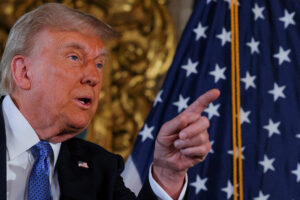By John Victor D. Ordoñez, Reporter
WASHINGTON’s stance in dealing with Manila’s dispute with Beijing over the South China Sea will hinge on who ends up joining US President-elect Donald J. Trump’s Cabinet, a security analyst said as his nominees favor a hawkish approach towards China.
“What remains to be seen is what posture the US will take toward the West Philippine Sea and the alliance in 2025 under Donald Trump,” Raymond M. Powell, a fellow at Stanford University’s Gordian Knot Center for National Security Innovation, said in an X message.
“Many of Trump’s initial cabinet nominations have taken hawkish positions on China and may look for opportunities to keep Beijing off-balance.”
Last month, Mr. Trump nominated former Director of National Intelligence John Ratcliffe to head the Central Intelligence Office, FOX News host Pete Hegseth as Defense Secretary and Florida Congressman Michael Waltz as National Security Adviser.
He had also named New York Congresswoman Elise Stefanik as the United Nations ambassador. They are known for advocating a “hard-line” foreign policy on Beijing.
“With the incoming Trump return to the White House, we will expect that China will intensify its gray zone tactics and legal claims in the West Philippine Sea,” Chester B. Cabalza, founding president of Manila-based International Development and Security Cooperation, said in a Facebook Messenger chat. “Beijing is poised to increase its aggression as it may see Manila topside more with Washington.”
The Philippines and China have been embroiled in repeated spats in the past few years over disputed features within Manila’s exclusive economic zone (EEZ), sparking regional concerns about a miscalculation and escalation at sea.
Just last Friday, Reuters reported that China’s coast guard said it warned and “drove away” a Philippine C-208 aircraft that “illegally” entered the airspace over Scarborough Shoal, which the Philippines calls Bajo de Masinloc, in the South China Sea.
China urged the Philippine side to immediately cease “violations and provocations”, the coast guard said, adding that it will continue to strengthen law enforcement in “waters under China’s jurisdiction.”
Philippine Coast Guard (PCG) spokesman Jay Tristan Tarriela clarified in an X post on Saturday that the PCG vessels and Bureau of Fisheries and Aquatic Resources (BFAR) aircraft left the vicinity of Shoal “by their own decision” after the successful delivery of supplies to fishermen in the area.
“The PCG vessels and BFAR aircraft conducted legitimate patrols in our waters at Bajo De Masinloc to ensure the safety and security of our Filipino fishermen,” Mr. Tarriela said.
“We have also noted China’s encroachment in Bajo De Masinloc, with the deployment of China Coast Guard vessels, the Chinese Maritime Militia, and even a PLA (People’s Liberation Army) Navy vessel.”
Mr. Tarriel also said Beijing has no jurisdiction over Scarborough Shoal, citing the 2016 Arbitral Award and Article 121 of the United Nations Convention on the Law of the Sea which classified it as a rock.
“The Philippines has sovereignty over it, including its territorial sea. The waters beyond Bajo de Masinloc’s 12-nautical-mile territorial sea up to 200 nautical miles, fall within the Philippine EEZ, measured from Luzon’s baseline.”
China has rejected the 2016 ruling, which invalidated its claims, under international law.
Brunei, Malaysia, Taiwan, The Philippines and Vietnam all claim parts of the sea. Tensions have risen amid concern over China’s expansive claims encroach on their exclusive economic zones.
In April, Republican Senator Bill Hagerty and Democrat Senator Tim Kaine pushed a bill that increased US military aid for the Philippines to $500 million from $40 million over five fiscal years through 2029.
The Philippines, one of the weakest in the world in terms of military capability, is important to Washington’s efforts to push back against China, which claims the South China Sea almost in its entirety.
Last month, Philippine President Ferdinand R. Marcos, Jr. said he had a “very productive” congratulatory phone call with United States Mr. Trump, following an election that has put countries in the Indo-Pacific region on a wait-and-see mode.
The Philippine leader said the relationship between the US and the Philippines is “as deep as can possibly be because it has been for a very long time.”
“Scarborough Shoal and Sabina Shoal have emerged as the two primary flashpoints as 2025 begins,” Mr. Powell said. “Second Thomas Shoal has, for now, receded as both the Philippines and China seem content with the murky terms of the truce reached last summer.” — with Reuters






